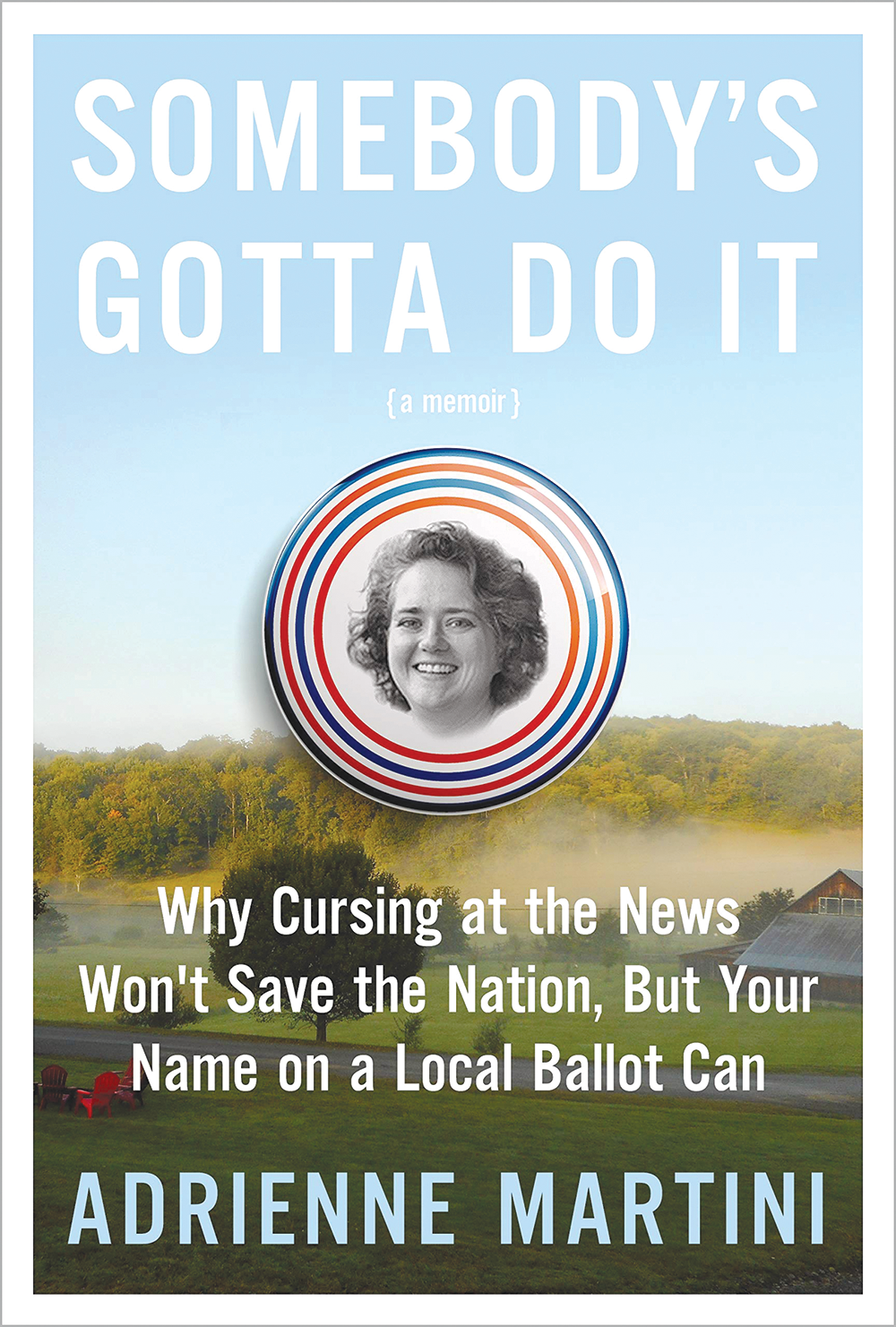Somebody’s Gotta Do It, by Adrienne Martini (Henry Holt & Co., 240 pages)
On one hand, Adrienne Martini suffered from terrible timing, her new book coming out amid a global pandemic.
On the other, it’s a book about running for public office, and it’s out amid the most social unrest since the 1960s. Hillary Clinton tweeted about it. By these measures, it should be on everyone’s best-seller lists.
Somebody’s Gotta Do It is Martini’s account of running for — and winning — a decidedly unsexy office: district representative for Otsego County in rural New York. It’s also a call for you to stop the doomsday scrolling and do the same, wherever you live. This is not just because the world seems to be imploding before our eyes, but because of what Martini calls “a ripe, juicy opportunity ready to be plucked,” the redistricting that will happen next year, establishing electoral maps for the next decade.
Before your eyes glaze over at the prospect of being lectured to by the District 12 representative from Otsego County (home to Cooperstown, if you’re trying to place it), know that Martini is genuinely funny, despite being a middle-aged woman who knits. A marathon runner who writes a biweekly column called Dry Martini on a running website (anothermotherunner.com), she is a reliable source of a laugh. That said, if you disagree with her political views and can’t take jokes aimed at your team, steer clear; you will only get angry. A previous memoir, 2010’s Sweater Quest: My Year of Knitting Dangerously, may have the distinction of being the only knitting memoir savaged by Amazon reviewers for being too political. “If you want to tell the world of your political views, then WRITE A POLITICAL BOOK,” one said.
Regardless of your political leanings, Somebody’s Gotta Do It is a fine manual for the aspiring politician (or public servant, if you’re less cynical than me). It begins with Martini’s meltdown after the election of President Donald Trump. (The president’s supporters would call this the onset of Trump Derangement Syndrome.) Suffice it to say, Martini was not pleased, and after the inauguration, she decided it was high time she got involved in the political process.
The campaign itself was revelatory. But so was plunging into the work. At the first budget session for new members, during which she realized that the salt-and-sand budget for her county “could pay for my house three times over,” she concluded that running for office was kind of like pregnancy, in that she had spent nine months being “obsessed with the wrong things.”
“I owned every book on pregnancy and delivery, but had no skills or knowledge about, you know, infants.” Similarly, she said, “I’d approached running for office armed with research and numbers and opinions about how to win, rather than collecting information about what happens once you’re sworn in.”
While much of the book is about her own experiences, Martini delves a little into history, including the violence done to women’s suffragists, and also research on the gender divide in elected office. Although more women than men go to college, fewer hold public office, because fewer of them run. Martini suggests that this is as much about a lack of confidence as it is lack of role models. “Give every woman the confidence of a middle-class white guy, and we’ll run the world,” she writes. However, when women do run, they’re as likely as men to win. It’s just getting them to agree to be on the ballot that’s the problem, she said. That looks to be changing, at least among pro-choice Democrats. The political action committee Emily’s List reported that 920 women asked for information on running for office in 2016; in 2018 the number was 26,000.
Martini shines when applying her “Dry Martini” wit to the indignities of seeking office, as in her list of things she learned while doing that quintessential politician task: knocking on doors. One person, she reports, told her they couldn’t open the door because everyone in the house had tuberculosis, “which can’t possibly be true, but whatever.” The humor, however, comes and goes amid instruction on how to ask people for donations, design mailings, and answer seemingly impossible questions such as, “What would you do to combat the opioid epidemic in the county?” If we get a little impatient between jokes, it’s because we’ve been conditioned for them and expect them at the end of every paragraph, a la Sedaris.
In addition to learning how to run for public office, readers of Someone’s Gotta Do It will emerge with fresh revulsion for the typical coroner system, in which people of any background can be elected to determine how someone died, so long as they’re 18 or older and live in the county.
Martini’s revulsion for that system, however, is surpassed by her revulsion to Trump, whose election, she writes, left her literally shaking.
Like the nonplussed knitters upset by Martini’s political leaning in her previous memoir, some people won’t be able to get past the Trump hate to find anything useful or inspirational here. But for those who can, or those who share her views, Somebody’s Gotta Do It is a breezy, informative look at the grassy roots of politics, with the cheerleading of an overweight marathon runner who knows what it’s like to persevere while in pain. “Running very slowly while crying is still moving forward,” she writes. “So is walking while muttering [expletive, expletive, expletive].” B+

BOOK NOTES
The most interesting thing in publishing last week was not in book stores but on Twitter through the hashtag #publishingpaidme.
The hashtag started as a means to expose disparity between advances paid to black and white authors, but wound up also showing differences between genres, and also the courage of authors who chose to participate.
Roxane Gay, a black writer of fiction and nonfiction, said she was paid $15,000 for her 2014 essay collection Bad Feminist, $100,000 for 2017’s Hunger: A Memoir of My Body, and $150,000 for The Year I Learned Everything, expected next year.
Those numbers horrified Mandy Len Catron, an American writer and professor currently living in British Columbia, who revealed that she received a $400,000 advance for her 2017 memoir How to Fall in Love With Anyone.
For perspective, Catron confesses that she was “a totally unknown white woman with one viral article” — which was “To Fall in Love With Anyone, Do This,” published in The New York Times in 2015. Without revealing sales numbers, Catron also said that three years later she is “laughably far from earning out that advance.”
I wish I could recommend we all buy a copy of How to Fall in Love With Anyone just to support Catron for her honesty. But I just found my review from three years ago, and all I could muster was a “B.” Better to buy something written by Gay (I gave her 2017 short-story collection Difficult Women an A) or anything by novelist Jesmyn Ward.
Ward revealed on Twitter that her advance for 2011’s Salvage the Bones, which won a National Book Award, was $20,000 — about $13,000 less than the average car loan taken out this month.





